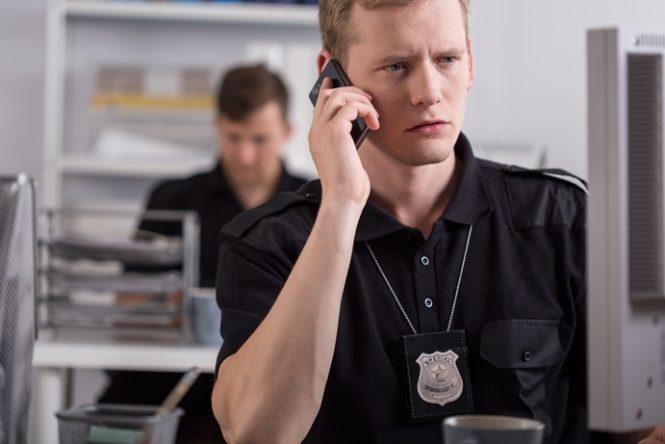
Reporting Crime
- Crimes can be reported to the police.
- If the police come to a crime scene they will look for evidence and witnesses.
- They may ask a witness to give a statement about what happened.
Being a victim often means that you will be involved with the criminal justice system. For some victims this is an important part of dealing with the harm. In some cases the victim may be able to choose whether or not to involve the criminal justice system. In other cases the victim may not have that choice.
Calling the Police
If you have been the victim of a crime you may choose to call the police. For example, you may:
- fear for your safety
- need help to get possessions back
- want to try to prevent someone else from becoming a victim
- need to file a police report in order to make a claim for insurance or victim's compensation
There are also some situations where you are required to report a matter. For example, if you have reason to believe that a child has been abused or neglected, you have a legal duty to report it.
Sometimes the decision about involving the police will be out of your hands. Someone may see a crime being committed against you and call the police. The police will then decide how to proceed.
Sometimes victims do not want to involve the police. For example, they may:
- be afraid of further harm
- blame themselves or feel ashamed
- be worried about getting the person in trouble, especially if the person is a friend or family member
It may help to have someone else report the matter for you. If the police want you to report the matter directly, it may help to have family or friends to support you. Support may also be available from Victim Services.
If you decide to call the police, the sooner you call the better. This gives the police a better chance of finding and preserving evidence and of catching the person who committed the crime.
When the Police Arrive
Depending on the circumstances, the police may come to the scene or you may go to the police station to report the crime. When the police respond to an emergency they will take steps to protect anyone in danger. The police will look for evidence and preserve it. In some cases this may mean that you cannot use property, like a car or your home, until the police secure evidence. If a death is involved, it may mean that a victim's body cannot be removed until necessary evidence has been collected.
The police may take property into custody, dust for fingerprints or take you for medical attention. In most communities, the police can contact Victim Services to assist you or tell you how to contact them at a later time.
Giving a Statement
When you report a crime to the police you will normally be asked to give a full statement. A police officer will talk to you and ask you questions about what happened. It is important to tell the police everything you can remember. The police may ask you to write out your statement or they might write the statement up for you to look over. Usually you will be asked to sign the statement. In some cases your statement may be recorded or videotaped. You can ask for a copy of your written statement.
It is important to carefully look over your statement. You may be upset or even in shock, so make sure you take the time you need to get your statement right. If the accused person is caught and there is a trial you may be a witness. As a witness you may need to appear in court to give evidence and discuss your statement. You may also be cross-examined by the defence about your statement.
It is important to note that it is a crime to give a false statement.
Investigating the Crime
Once a crime is reported to the police they will start an investigation. The police may need to talk to you again during the investigation. They may ask you to make another statement. You may be asked to identify a suspect or missing property.
You have a right to information about the investigation. How and when you are given information about an investigation may vary. You should make a note of the badge number and contact information for the officer in charge of the investigation, as well as the police file number. This can be helpful if you want to request information about the investigation.
The police will tell you how the matter is being dealt with. You can find out if the investigation is ongoing and if charges are likely. You can ask the police to let you know if they lay charges. Some Victim Services programs can help you access this information. You can ask for the names of the accused after charges are laid. Once the matter goes to court the names of adult accused are public record. The police will not give you information that could interfere with the investigation or affect someone's safety or security. They will also not disclose the names and contact information of other victims or witnesses.
After someone is charged they may be kept in jail until the trial, but this is unusual. When deciding if the person should be free until the trial, judges need to consider the safety of victims. If you have concerns tell the police, Crown Prosecutor or the judge. For more information see Safety for Victims. If the accused person does not admit to the crime and there is a trial, you may have to go to court to tell the judge what happened. See Going to Court for information about appearing in court, support for victims who must testify and privacy in court.

